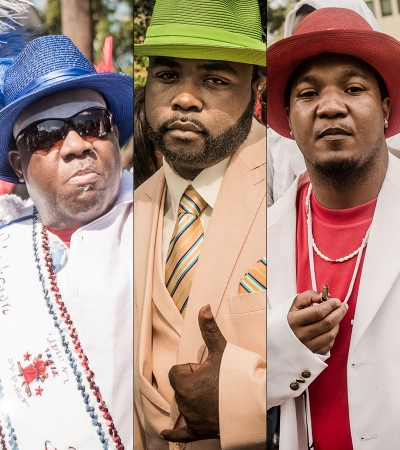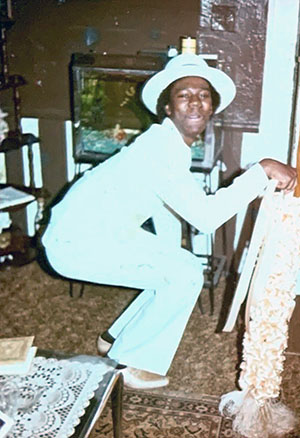
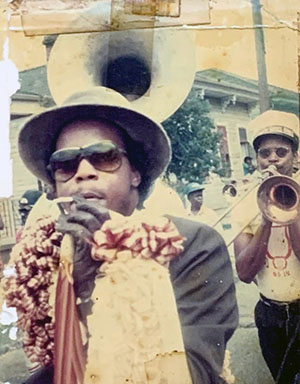
Tammy: If my husband, Zell was still alive, this house would never be this quiet right now.
Moe: He would be playing the music so loud.
Tammy: He’d be up in here talking to you, cutting up, saying all kinds of bad language while telling his stories.
Buck: You would have had to do a lot of editing with his language. A lot of editing.
Tammy: There was never a dull moment in my house. My house feels so funny without Zell in here. For a while, I had to go stay with our daughter, Natasha, in Slidell because I felt like I was cracking up. I would sit here, waiting on him to wake up and call my name. He’d call you a hundred times a day. He knew everybody.
Throughout our marriage, he had many different trades. He worked in hotels. He worked auctions. He worked for Budweiser. He drove the trucks. But his passion was music and his club. It began in 1965 when his grandmother put him in with the Young Men Olympians. He told me that uncles of his were the founders of the Young Men.
Buck: He was a young guy with the Young Men Olympians. Later on, he started his own division called the Swingers. He ventured off and started his group.
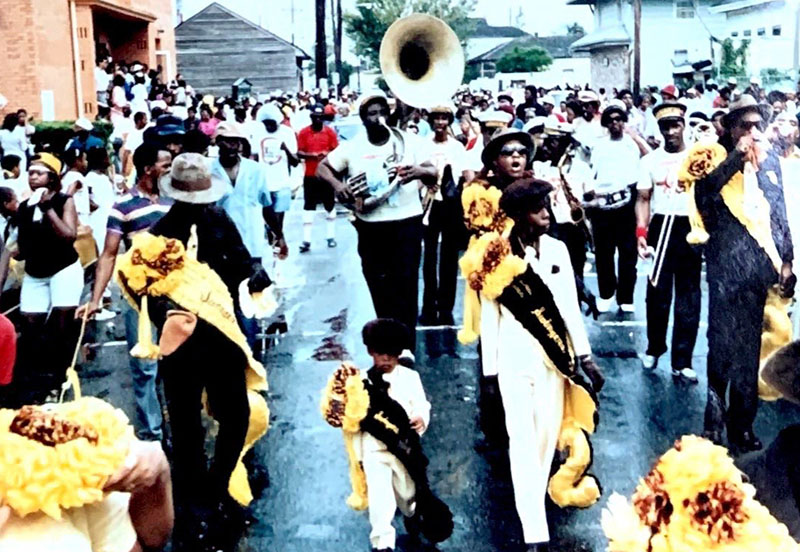
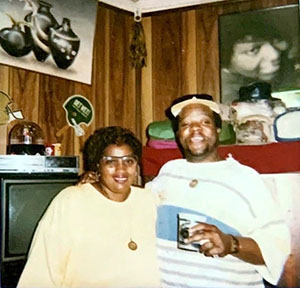
Tammy: He founded the Uptown Swingers in 2004. The first year, he started the parade by his older sister Elaine Hymel’s house at 4620 Loyola with the Hot 8 Brass Band.
Buck: The club is family oriented. Everybody’s been knowing each other for a long time, so we’re real, real tight. My daughter started with them first, and I used to be out there to support her and the rest of the family. Zell was like, “Man, you need to come on join us, too!”
“Nah, man, I don’t know.”
“Your daughter here so you might as well.” When I joined in 2008, I found out it’s a totally different world walking on the side versus being inside the rope. You feel good walking outside, but when you’re inside, and you’re actually a part of it after going through the year of hard work preparing, it’s a feeling that’s hard to describe.
Tammy: I stay behind the scenes. I like the low profile. Zell rented a car for me to ride in during the parade because I don’t like all that flashy stuff. He said, “Bae, one year I want you to be the queen.” I said, “I am your queen. The queen in the house.”
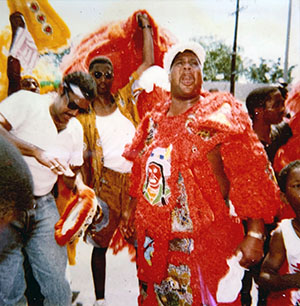
Buck: Zell took me under his wing, and I became the business manager in 2009. He’s going to be missed by a lot of people. Moe and I are going to keep his legacy going.
Home for the Music
Tammy: Ezell grew up in the Calliope Housing Project with his mother, grandmother, and aunts. He went to Booker T. Washington High School. I didn’t grow up in the projects. I’m from Uptown by the river, a block and a half from the Elk’s Hall where the Young Men started. I met him in 1982. It was a Saturday, and I was heading to the bus stop, tending to my business. He was at a jazz funeral for one of the old members of the Swingers. He came over and hollered at me. From that day on, we were like two peas in a pod. We married in 1999. At our house, he didn’t play with the children going to school. In the morning, he cut up all through the house until everybody got up. I said, “Zell, you have to stop.”
“That ain’t how they gonna listen. I got to run this here.”
When music was playing, Zell wanted to be there. He played drums. His best friend, Jerod “Rody” Lewis, was an Indian. They were raised together in the Calliope, and Zell played for the Black Eagles every Mardi Gras.
Zell had the same ratty drum since he was 10. He would not throw it away. He loved that drum and took care of it. He bought new heads for it, and, over the years, as he got the passes from performing at Jazz Fest, he stuck all of them to the drum. He liked to keep everything like souvenirs. We have piles of pictures he’s taken everywhere. He was very sentimental. During Mardi Gras, he was a flambeaux carrier and used to perform at Donna’s Bar and Grill with his band, the Indian Rhythms.
When Katrina came, I lived out there by Robert E. Lee. I lost everything and some of my family members told me their houses didn’t get no water. I said, “Zell, God do things for a reason. They washed everything away from me. I’m not going back to New Orleans. I’m gonna head to Atlanta.” We went with my mama, but she wanted us to take her to Baton Rouge where her sisters were staying. When we got to Baton Rouge, Zell said, “We’re close to home. I ain’t turning around to go back to no Atlanta. I’m going to stay as close to New Orleans as I can.”
Remember they had the big ReNew Orleans second line? The Uptown Swingers paraded with it, and after that he said, “I can’t stay here no longer. I got to get back home to hear the music.”
“What music you want to hear?”
“The second line music! We goin home!”
I said, “Okay, bae. We’re going to find something.” We wind up staying in Baton Rouge until 2007. When we moved back to the city, he wanted to move closer to Uptown.
A Big Family
Tammy: Zell ran his second line group like one big family. He was very tight knit with them. He was also strict with them, but they all loved Ezell. He loved all of them in different ways. I said, “Zell, you’re too hard on them.” He said, “Look Tammy, you don’t know what’s going on. Let me handle this. I have a special love for them.” He understood where everyone was at: “I give one person an inch, they’ll all want to take three million miles. I’ll pull them to the side, and let them know, ‘If I do this for you, you keep this to yourself—it’s between me and you.’”
Buck: He had his own way of dealing with it, and it always worked.
Tammy: Sometimes he chewed them out in front of everybody and made them embarrassed. He said, “I’ll pull them to the side and tell them why I did it—to get their mind together.” You had to be on time with him. If you told Zell you were coming here for two o’clock, get in here at a quarter to two. If you’re not in the door at least three minutes before two, he cut up, cussing. Some people thought he was arrogant and outspoken. But he had a good heart.
Buck: A lot of people respected him.
Tammy: His club members knew I was able to keep Zell under control. They called me if he got on them too much. “Tammy, can you please tell your husband to stop using the bad language out in the street in front of people?” And I will get on him, “Zell, please stop talking to people that kind of way.” He would say, “Bae, they ain’t gonna have no parade if they don’t put their money up.”
Buck: As the business manager, I have to deal with it, too.
Tammy: Every year Zell paid City Hall, the police, the bands. And then he gave everything over to Buck.
Buck: When he asked me, he said, “Man, I’m tired. I need you to take care of this. I’ve got enough stuff to take care of. I can trust you—you’re family—and I know you wouldn’t mind doing it.” No indeed, I wouldn’t mind doing it. He introduced me to a lot of people in the second line world. He taught me a lot about how to run a club, how to conduct oneself in the surroundings of the peers, and how to make orders. Who to call, who not to call, how to deal with Jazz Fest. I took a lot of that weight off his shoulders. Since he passed, Byron Hogans, the president of the Dumaine Gang, said, “Man, I’m going to keep you in the loop about everything that’s going on. We’re going to still continue to have our conversations.”
Colors
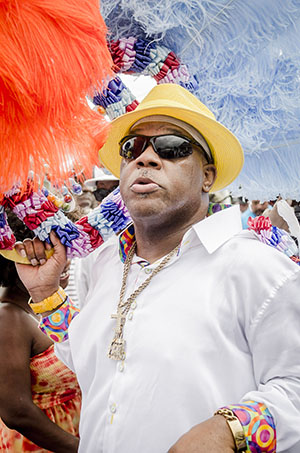
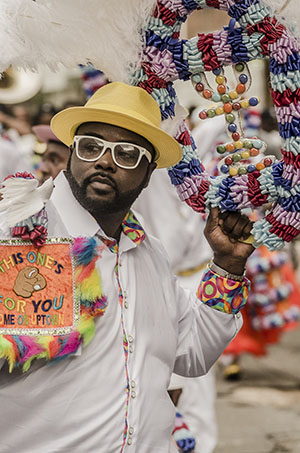
Tammy: Every year, the club had the Swingers’ Picnic. They sat down and talked about the parade, and what colors they wanted to wear for the next year. Zell sat there writing it down, taking it in. But at the end of the day, he was still going to do what he wanted to do—even put in a different color.
He used to say, “I parade in June, I’m not wearing no dark colors. I like pretty, light colors.” He thought they kept you cool. Several times, people tried to get him to change the date: “Man, they got a lot of people who want to parade with you, but they say June is too hot for them.” He wasn’t persuaded: “I’mma keep my June.”
Buck: He liked for the parade to be at the end of the year. The last parade. He never wanted to change his date because he had a chance to see everyone else’s parade and could tweak things so that we would be sure to be different. We all voted on the themes, colors, and designs, but at the end of the day we knew if he needed to tweak something, we trusted him to do that.
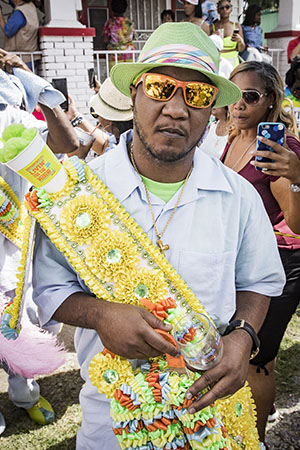
Tammy: He’s not gonna miss a Sunday. Only time he missed a Sunday is if we had an engagement that somebody invited us to. But if we got back in time, he was going to catch the end of the second line. He wasn’t gonna let it pass him by.
Buck: He made all our decorations with Tammy and Moe. Everything that you see that the club wore, he made it.
Tammy: Yeah, he didn’t let nobody else. He drew it, Moe cut it out, and we put it together. Every year, Zell made me order all their suits. I ordered all the velvet for the streamers. We went to Chalmette for the ribbon. When I tell you he wrapped a lot of ribbon, he wrapped a lot of ribbon. Zell said he didn’t want nothing skimpy. He set up in January wrapping ribbons until May. Nobody else could touch it because it had to be perfect. After he get all the ribbon wrapped, then he wanted us to start putting it on the decorations. Moe, my niece and them, they bust and open up all the bows and I had to make the ruffles.
Tammy: Buck’s first year, he had a problem with all of y’all because we ordered a cotton candy pink suit. He said, “Bae, all of my members keep saying they don’t want to wear the pink!”
Buck: Oh yeah! I’ll never forget that year.
Tammy: He said, “The color that I’mma put together, they gonna love it.” He always did have a big club, and half of the club members? They were so mad at him, but he went ahead with it. That morning they was getting dressed, all of them started looking at each other. They were so happy, hugging each other like children with some kind of new game that just came out.
Buck: It was real pretty.
Tammy: All the ladies in the club wore different colors: two of them had orange, two yellow, two with the lime green. Everybody was taking pictures like they were crazy.
Surprises & Discipline
Tammy: The morning of the parade, the house be in an uproar of people. Upstairs and downstairs, they be in all the bedrooms and Zell be back there with all the cussing. I tell them, “Will y’all please calm down!” You would think that I would get used to it after all those years. I can hear him saying things like, “I told the women to go upstairs and get dressed and men are standing out here! What the hell the men up there for?!”
Buck: We are usually a big club. The last few years, we had 13 men, 11 women, and about 7 little boys. Some years we came out as one division. Other times, Zell waited until the morning of the parade and would let the women know, “Look, y’all have your own band. Y’all going on your own. We’ll pick y’all up.”
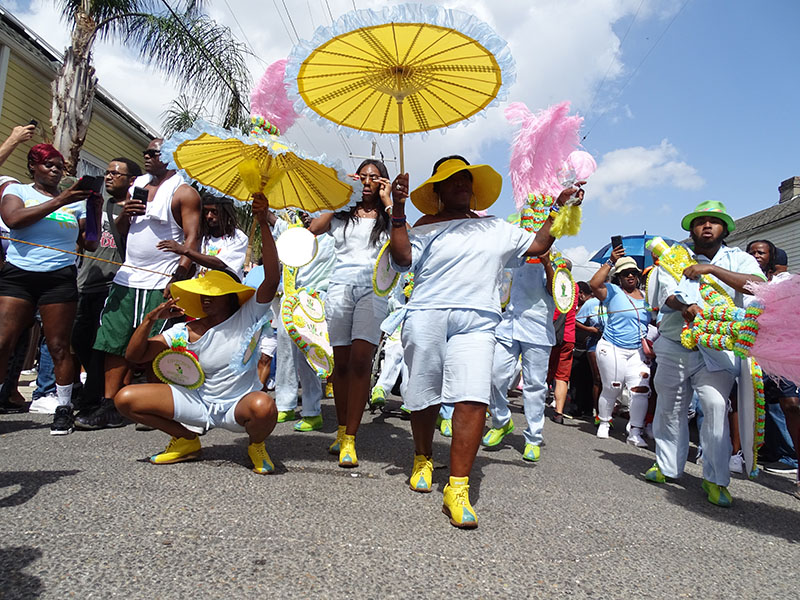
Tammy: My baby sister, Trenell, is the president of the women and she would be so excited. She said, “Zell, who you got for us?”
Zell said, “Don’t worry about it!”
“I don’t want nobody but Travis.”
Zell said, “That’s our band!” He’ll be faking out. The men will start off with Da Truth, and when they get to my sister to pick up the women, he’d give the band to the women, and they’ll take To Be Continued with the men. They’d fuss, “Zell, you played us! You didn’t tell us what you’re doing!” He said, “I wanted to surprise you.”
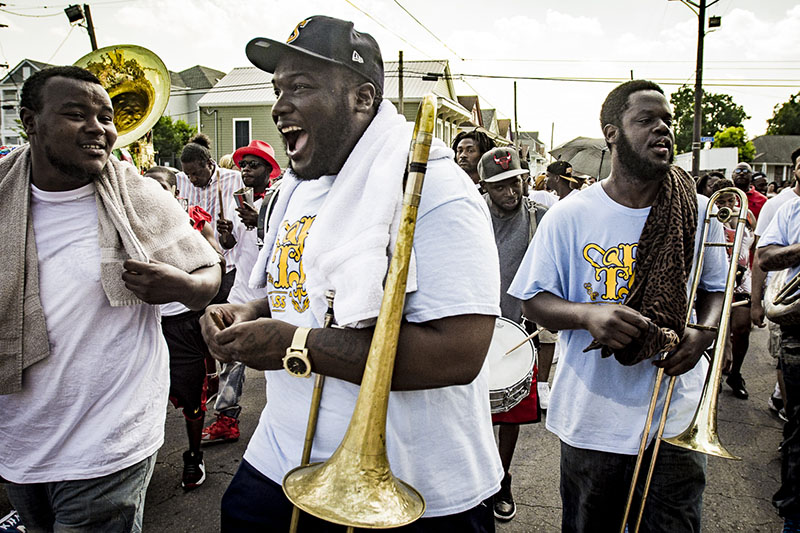
Moe: Every year, he brought the band from the street.
Buck: He’d pick us some bands off Frenchmen or Bourbon Street that hadn’t gotten a start. He’d give them a chance.
Tammy: Zell was a person who sat back and observed the music scene. He said, “They got a new band playing and they’re called To Be Continued. I’mma put Hot 8 down this year and get them.”
I said, “Zell, they might not be good.”
“Tammy, I’m telling you, these little boys can play, and my members gonna like them!”
Moe: The club ain’t know them, but we believed him.
Buck: We make only a few changes in our route each year. We always begin at Elaine’s on Loyola.
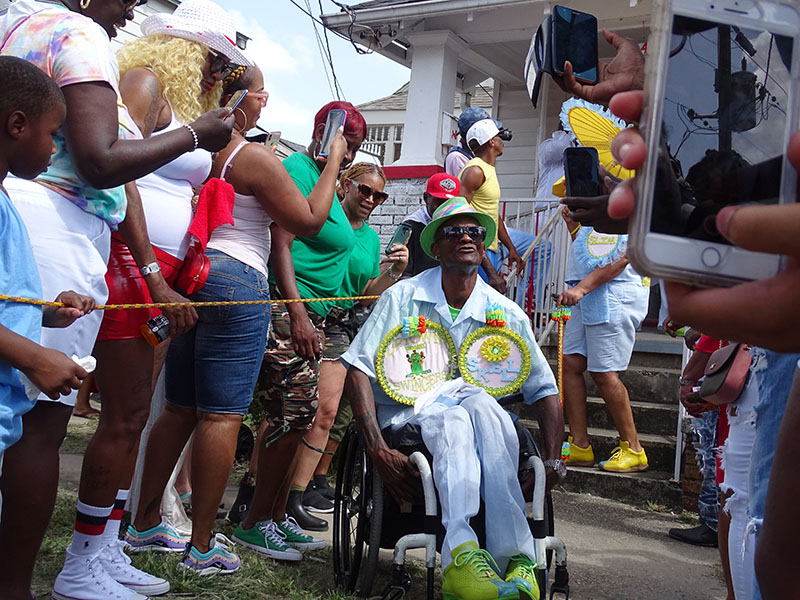
We go up to Valance to Magnolia, then up Magnolia to Napoleon. Every other year, we’ll turn left on Napoleon and go to Claiborne. Sometimes we’ll go straight up Magnolia and stop at my house. We go up Louisiana and make a left on LaSalle to Washington where we turn right and stop at the Purple Rain. Go up Washington.
Moe: He loved to go up a big old, wide street.
Buck: He loved going to Washington, too, because of the live oak trees. It’s good shade when it’s so hot. We turn at Dryades to make a stop at the Sportsman’s Corner on Second Street.
Tammy: The next stop is at Eureka Mitchell’s house.
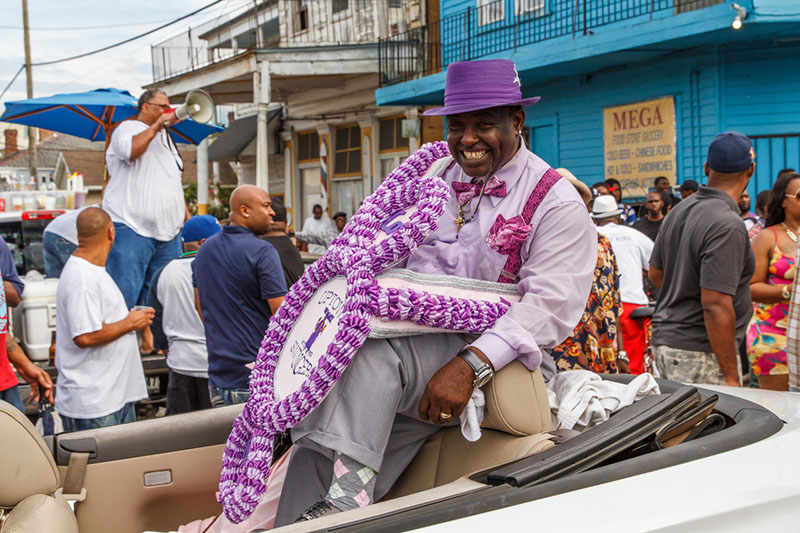
Buck: From there, we’ll continue up Jackson to Dorgenois, make a right on Dorgenois to Martin Luther King. Every other year we’ll stop in the Calliope.
Tammy: A lot of people from the Calliope knew Zell. They told him the club could stop at someone’s house who still lived in the new development. He always said, “That’s where I’m from. It’s still the Calliope no matter what they say it is. I’m born and raised from 3309 Martin Luther King and I’m gonna go there every time I get a chance.” A lot of people from the Calliope followed his parade.
Buck: Sometimes we’ll come back up Martin Luther King to Dorgenois and break up at Tapp’s.
Tammy: At the end of the parade, all the club members come back to our house to change back to their street clothes. The last five years, I started cooking food for them. Zell, he’s always a bean man. We’ll have red beans, fried chicken, and salads. Everybody comes back, sits down, and talks about what had happened that day. He liked all that.
A week or two later, he invited everyone back to watch the whole parade on the video tape. Everybody had to be here and had to be on time. If you weren’t on time, your fine got put down. They be drinking, having fun talking about how they enjoyed their day. And if they saw someone outside the ropes in the parade, Zell fined them.
Moe: That’s why he liked to look at the video tape. If you out the rope, you get a fine for that.
Buck: Yeah, sat there and critiqued the video. You got fined for taking your decorations off. You got fined for taking your hat off. You had to stay in uniform the whole parade.
Tammy: Oh, he’s going to watch the video very carefully.
Buck: And that’s why everybody had to be there, so they can’t say, “Oh no, I didn’t do that.”
Tammy: Every Sunday, if you went to a parade, you had to have your Uptown Swingers shirt on. If you didn’t, you got fined. If Buck was at the parade, and he saw somebody out of uniform, he had to write down where he saw them. Same with Emmanuel “Peanut” Hines, the parade chairman. If Peanut saw somebody out of uniform, he had to tell.
Tribute
Buck: Zell passed on November 1, 2020. It was a Sunday. His favorite day of the week.
Tammy: When I called his club members that Sunday morning, they were coming in here crying; they were on their knees. They just really couldn’t believe it. When the second line season can start again, the club is dedicating the parade to Zell. We had done the embroidery already because he started doing his decorations in November. He had all his ribbon, the feathers, the velvet. We have everything in here. He was waiting and praying for when the city said we could go.
When they open back up, the colors will be lavender, purple, and silver. It’s going to be beautiful. My son told me, “Mom, I’m going to do the number one more time for my daddy. We’re going to wear those colors for him because that’s what he wanted to do.” Everybody who ever second lined with him who’s still here, they all say they want to do it. We’re going to make it one big old parade. I believe a bunch of them will keep parading, too.

